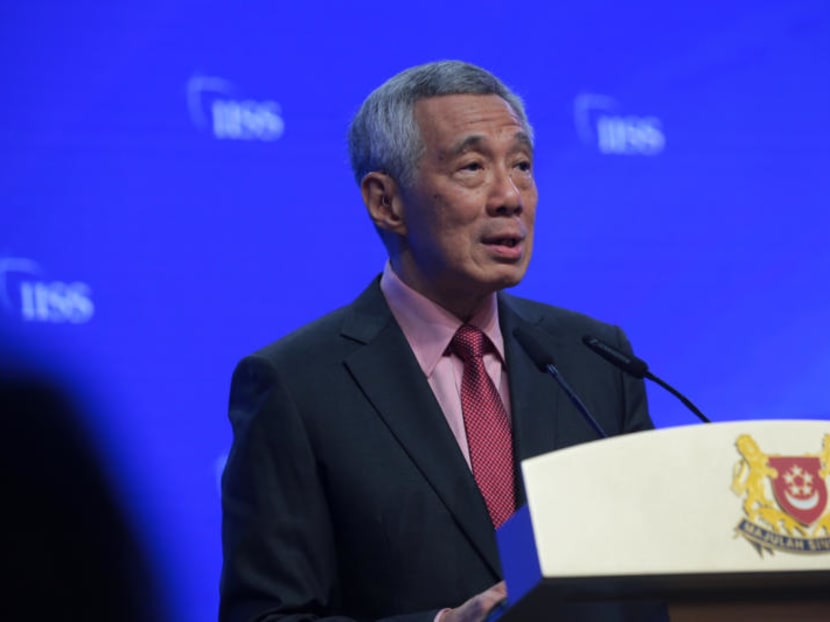Reform multilateral institutions but don't abandon them, urges PM Lee
SINGAPORE — A world that lacks internationally accepted rules, where "might is right", will hurt all countries and be especially challenging for small states like Singapore, Prime Minister Lee Hsien Loong said on Wednesday (Aug 7).
SINGAPORE — A world that lacks internationally-accepted rules, where "might is right", will hurt all countries and be especially challenging for small states like Singapore, Prime Minister Lee Hsien Loong said on Wednesday (Aug 7).
"That is why international treaties and the rule of law are especially important to us: Every word makes a difference, and when we sign a treaty, we will rigorously uphold what we have solemnly committed to," said Mr Lee at the signing of the Singapore Convention on Mediation at Shangri-La hotel.
The Singapore Convention, which was signed by 46 countries on its first day so far, will allow businesses to reach a mediated settlement in an international commercial dispute and be able to enforce the settlement terms in the courts of the signatory countries. This will advance international trade, commerce and investment, Mr Lee said.
It is also a "powerful statement in support of multilateralism", he added.
Noting that the concept of multilateralism is under pressure and that multilateral institutions are imperfect, he said the solution is to improve multilateralism, and not abandon it. These institutions include the United Nations and the World Trade Organization (WTO).
The United States, which was one of the signatories alongside China, has repeatedly hit out at multilateral organisations, with US President Donald Trump recently accusing the WTO system of allowing the world's richest countries, including Singapore, to claim to be developing countries.
Singapore has said that it does not avail itself to the special and differential treatment that comes from its developing country status under the WTO.
Speaking to dignitaries from around 70 countries, Mr Lee said: "Many (multilateral institutions) are in need of urgent reform, suffer from a loss of confidence, or have practices and structures that are no longer fit for purpose. But we must recognise that these institutions have collectively brought the world growth and prosperity, and contributed to the peace and security we have enjoyed over decades.
"Abandoning them would upend the rules-based world order that we have so painstakingly built up."
Instead, the world needs to reform them and bring them up to date, Mr Lee added, so that they "reflect current economic and political realities" and are ready to deal with issues created by technological progress and globalisation.
The Singapore Convention adds on to the 1959 Convention on the Recognition and Enforcement of Foreign Arbitral Awards, also known as the New York Convention, which allows arbitration between businesses in different nations during cross-border disputes.
Some businesses also rely on litigation to resolve issues, noted Mr Lee.
Having the Singapore Convention, which Mr Lee described as a "robust framework to manage such conflicts", can prevent disputes from escalating unnecessarily or cause unintended consequences, he said. Businesses will also gain from increased flexibility, efficiency and lower costs, while countries can boost access to justice through enforcing these mediated agreements.
"The Singapore Convention on Mediation is the missing third piece in the international dispute resolution enforcement framework," said Mr Lee.
A similar attempt in 2002 to agree on an international approach of enforcing mediation settlements fell through, during the discussions on the Model Law on International Commercial Conciliation.
With the signing, Mr Lee said it shows that countries are capable of achieving consensus “with effort, creativity and leadership” and have recommitted themselves to multilateralism.
For Singapore, it marks the start of a long-term commitment to promote the Convention and see to its adoption, he added. Several significant initiatives on international dispute settlement will also be taking place this week.
Among these, he highlighted the newly-refurbished Maxwell Chambers Suites — the site of the former Traffic Police headquarters — which will hold its grand opening on Thursday (Aug 8) as the world’s first integrated dispute resolution complex.
“These events affirm Singapore’s role as the leading international business and legal centre,” he said.









